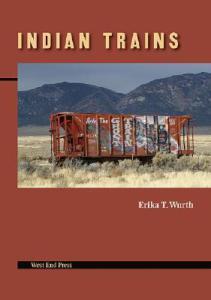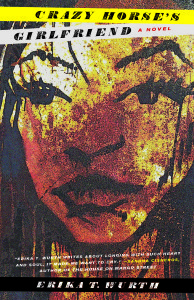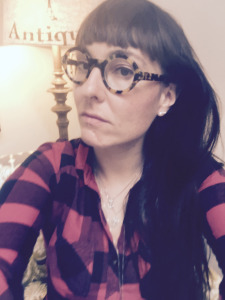Banned Books Month Guest Post from Erika T. Wurth: Assimilation Makes Us Soooo Happy
In 2010 the Arizona state legislature, ring-led by then-Superintendent of Schools Tom Horne and then-State Senator John Huppenthal, banned seven books (specifically), and outlawed any classes that “promoted the overthrow of the United States, fostered ethnic resentment or treated students as members of an ethnicity rather than as individuals.”

West End Press, November 2007.
When this first came down the social media pipeline, it joined the many issues that I filed in my head under what the actual fuck, America. But as it continued to play out and I learned more about what they were doing, what they had done, and how extensive it was, I realized how close to home this could be. What I learned was that they were banning any book that addressed identity. And then I realized that that included mine. Of course, the only book I had out at the time was a collection of poetry called INDIAN TRAINS that only a handful of Natives and my mother had read (she keeps it in her living room next to the baby mocs my Auntie beaded for my sister). I can only imagine what they would have thought of my novel, with its drug dealing pregnant F-bomb dropping protagonist. When people began to respond to my realization, the reaction was generally, COOL DUDE! I wish I’d written a book that was banned! But it didn’t feel cool. It felt hateful. My book, and any book by a person of color, a woman, a queer person or, it turned out Shakespeare for fuck’s sake, could be seen as a text overly-invested in identity.
There is such double-speak here. I remember after a particularly brilliant reading by a friend (another Native poet) a colleague of mine reacting to her reading by rolling his eyes and stating that identity was sooooo persuasive. I think that because her work evokes emotion (and it certainly did for her audience that day), that made that scholar uncomfortable. But more than anything, what made him uncomfortable was hearing lovely, poetic language used to describe the fact that on her reservation, children were suiciding, and that there were reasons for this. Reasons he was complicit in, simply for being a citizen of this country. What amused me about his reaction, and what always amuses and eventually angers me about this idea that identity is only something that people of color, or queer people, or woman have is how blatantly untrue it is. Identity is something that everyone has. DUH. And that if one is from the dominant group, the only difference is that it is so big, it is invisible. I also think about how sacred identity is to straight white males. How carefully they guard it, any hint that they might be like women, or not straight is met, often, with violence. So I’m pretty sure that whatever was deemed appropriately identity-less in Arizona still had plenty of what anyone could identify as identity. Just white, straight, male and therefore so big as to be invisible identity. Indeed, the school board, after this ban, approved only one book by a Latino author despite the fact that independent research illustrates that courses and books that revolve around Latino identity improve student achievement for Latino students.
Or was it despite?

Curbside Splender, September 2014.
All of this reminds me of Rand Paul’s recent statement that if Native Americans would only be forced to assimilate, we would be so much happier. Yes. Enforced assimilation… such as, perhaps, a decimation of 90% of our population and subsequent sending of the remainders of us off to boarding schools in the United States and in Canada where we were punished, often physically, for speaking our languages? Perhaps enforced assimilation like sequestering us on tiny plots of land? Perhaps something like that, would make us soooo happy. Thanks, Rand Paul. You’re right. Assimilation makes people really happy.
All sigh-tastic sarcasm aside, I think this is the point. Rand Paul, Arizona’s Tom Horne, and others of this ilk know perfectly well what this is all about. It’s about suppression under the guise of the right kind of wording. Because here’s how it works: when you see someone like yourself in any public medium you begin to think you can do the things that those people are doing. You begin to realize that there is absolutely no reason why you can’t achieve. They know this. This is their point. If they can take us out of art, we have no power. We do not see ourselves. We will go back to slaving and dying. And you know what? There is no reason for that. It makes everyone unhappy. It makes for an imbalanced, capitalistic, earth-destroying world. So no thanks, Rand Paul.
There is a semi-happy ending to this story. The ban was reversed. But the fight is still on. There are school boards still fighting to ban any reflection of a diverse self, to keep things as they are. The big presses still publish predominately white, straight men. Children of color are still underrepresented in high education.
Sooooo happy.

Erika T. Wurth.
Erika T. Wurth’s novel, CRAZY HORSE’S GIRLFRIEND, was published by Curbside Splendor. Her collection of poetry, INDIAN TRAINS, was published by The University of New Mexico’s West End Press. A writer of both fiction and poetry, she teaches creative writing at Western Illinois University and has been a guest writer at the Institute of American Indian Arts. Her work has appeared or is forthcoming in numerous journals, such as Boulevard, Drunken Boat, and Southern California Review. She is represented by Peter Steinberg. She is Apache/Chickasaw/Cherokee and was raised outside of Denver.








